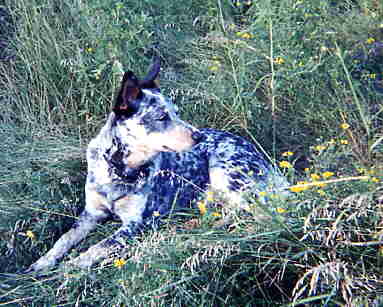| |
Two
Observation on the Animal Mind
I've been searching for the
mind, trying to understand "the self". I recently had two
observations about the animal mind that, perhaps, illustrate the difference
between the cognitive mind and the experiential mind, both of which
we share with other animals..
 I
was walking with my dog, Lucky, and Susan; an acquaintance. Susan was
walking Beau. Up on the hill we can see Hutch, a young lab, a very submissive
young dog. Hutch rolls over on his back when anyone approaches him,
no matter who. And Beau, a crotchety, rheumatic curmudgeon, had been
picking on Hutch of late. So now Lucky has taken to walking between
Beau and Hutch, and shouldering, nudging Beau away Hutch. I
was walking with my dog, Lucky, and Susan; an acquaintance. Susan was
walking Beau. Up on the hill we can see Hutch, a young lab, a very submissive
young dog. Hutch rolls over on his back when anyone approaches him,
no matter who. And Beau, a crotchety, rheumatic curmudgeon, had been
picking on Hutch of late. So now Lucky has taken to walking between
Beau and Hutch, and shouldering, nudging Beau away Hutch.
Surely we are observing forethought in
this behaviour : that is a cognitive process. It is a goal direct process
and, in this case, the goal is altruistic.
The second observation needs
a little bit of background. Lucky hated loud noises. (Once he jumped
up at Jeff's hammer wielding hand to try to stop the noise. And when
Nando would do ceremony in our front room, singing loudly and drumming,
Lucky would creep from the room and watch, forlorn, from the doorway.)
I need to mention, briefly, the concept
of displays: like when two strange dogs meet through a fence, they crouch,
bark fiercely, and furiously wag their tails. Not quite a game : a dog
thing : and a display.
So: Lucky and I were walking in the ravine,
and we heard a chain-saw. Knowing my dog, I put him on his leash. As
we approach a man cutting through a stump, Lucky goes into his display,
barking fiercely and pulling on the lead. The old leash snapped and
Lucky lurched forward, only a couple of steps, and stopped.
Same thing again, another time, on the
street outside our house : a youth on a noisy skateboard. Lucky displays
his noise-rage. This time his old collar snapped. Again, he staggered
a couple of steps, and stopped.
What I'd like you to consider... imaging
yourself in a similar situation : a sudden, urgent, change of circumstance.
No time for verbal thought, or reflection. One reacts. The consciousness
of such events is experiential, is non-verbal. And I believe we can
sense, here, that our experience is much the same as the Lucky's.
There is a cognitive consciousness,
which is in some part verbal, and rational, yes: and an experiential
consciousness, which sometimes may involve non-verbal concepts, may
involve decisions, and this we share with other animals.
Oh: and some years back i wrote a rambling essay on the animal mind,
that also could be of interest, so I'll give you the link to
the animal mind
|
|